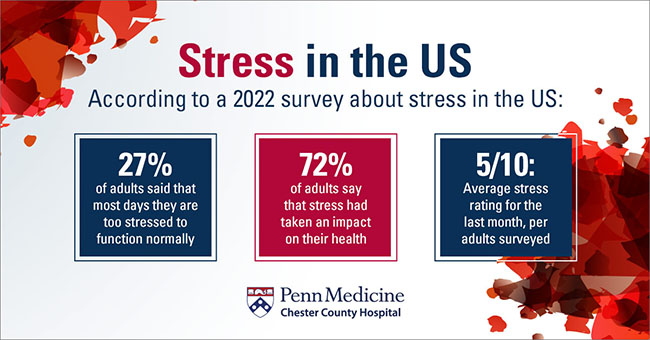7 Surprising Ways Stress Can Show Up in Your Body
August 02, 2023

As you are trying to get dressed, get ready for work, and pack your children into the car, you can't help but already feel weighed down by the day ahead. It seems like someone always wants you, making it hard to find a moment of peace.
You can feel your heart beating faster than normal. You try to breathe calmly in and out. Your heartbeat slows — but this isn’t the only way stress is affecting your body.

Stress can show up in many different ways throughout the body, and its impact can extend beyond just mental or emotional symptoms.
Here are 7 Surprising Ways Stress Can Show Up in Your Body:
- Hair Loss
Stress can be a sneaky culprit behind hair loss, affecting both men and women. When the body experiences prolonged stress, it can disrupt the normal hair growth cycle. Medical experts are still researching the connection, but recent studies suggest that stress hormones negatively impact the stem cells that are needed for hair growth.
Hair loss can be distressing, but it doesn't have to be permanent. Talk to your primary care provider or dermatologist about your hair loss concerns.
- Digestive Problems
Stress can trigger or exacerbate digestive issues such as stomach aches, acid reflux, irritable bowel syndrome (IBS), or inflammatory bowel disease (IBD).
"When you're feeling stressed, you might also notice changes in your eating habits," says Chester County Hospital Nutritionist Maureen Boccella. "Some people eat more when they're stressed out — and some people eat less." Boccela adds that stress can also leave you feeling rushed or like there isn't enough time to prepare a healthy meal, leaving you to choose fast food or other less nutritious options.
- Skin Issues
When you’re stressed, it can show up on your skin in ways you may not expect — or want. Have you ever noticed breakouts or pimples popping up when you're going through a stressful time? That's because stress produces different hormones in your body, and some of them cause the hair follicles and the oil glands in your face to react, leading to skin breakouts.
Stress can also worsen existing skin conditions like eczema or psoriasis, making them more irritated and uncomfortable. Taking care of your skin with a good skincare routine and finding healthy ways to manage stress, like exercise or mindfulness techniques, can help keep your skin happy and healthy.
- Jaw Tension and Teeth Grinding
There are a lot of places on their bodies people describe "carrying" their stress. Some people feel the effects of stress in their neck. Some people hold their stress in their shoulders or back. You can also tense up and feel the stress in your jaw.
Stress can lead to both jaw clenching and teeth grinding, also known by the medical term "bruxism". You might notice yourself clenching your jaw while you’re awake and may need to remind yourself to relax and release that tension. But you might also clench your jaw or grind your teeth in your sleep, leaving you with unexplained headaches or tooth pain.
- Changes in Menstrual Cycle
A late period or an irregular menstrual cycle can be stressful — but they can also be caused by stress. If that wasn't reason enough to manage the stress in your life, stress can even make your periods and cramps more painful.
There are plenty of reasons why you might miss a period, some of them small and some of them more serious. If you have an irregular menstrual cycle, talk to your primary care provider or gynecologist to learn more about potential causes.
- Eyelid Twitching
Eye twitching, that spasm or movement of your eyelid, can be annoying — and it can be linked to stress. A twitching episode may last a few days, and it often goes away on its own. So if you find yourself dealing with a persistent eye twitch, it might be a sign that you need to take a step back and find ways to relax.
Other bad habits, like lack of sleep or too much caffeine, can also lead to eye twitching.
- Difficulty Sleeping
Stress can have a negative impact on your sleep patterns, making it difficult to fall asleep, stay asleep, or achieve restful sleep. When you’re feeling stressed, racing thoughts, worry, and anxiety can keep the mind active, making it hard to relax and drift off to sleep.
The lack of quality sleep caused by stress can create a vicious cycle, as poor sleep can make you even more irritable and stressed out… which means you still can't sleep. Managing stress through breathing techniques, establishing a consistent bedtime routine, and creating a good sleep environment can help you manage your stress — and hopefully get better sleep, too.
Don't Let Stress Get the Best of You
Everyone will experience stress a little differently. Take time to check in on your mental health, and think about which of these signs of stress you might have seen in your own body.
Talk to your primary care provider or a mental health specialist if you feel like you've been in a long period of stress — or even if you just want to better respond to stress when it shows up. With mental health strategies and physical exercise, stress doesn't have to get in the way of living your best life and being your best self.
Get a Handle on Stress
Mindfulness can be an important part of managing the stress in your life. Contact the Penn Program for Mindfulness and sign up for a mindfulness course.